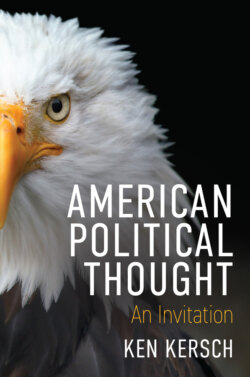Читать книгу American Political Thought - Ken Kersch - Страница 23
The Creation of the Constitution
ОглавлениеIn many respects, things did not go well for the new United States, whose independent status, in a world of global imperial contention, was precarious. Domestic squabbling, disorder, and dysfunction were perhaps even greater problems. This troubling state of affairs led to another round of serious reflection and disputation over the nature and requirements of good government.
The initial governments established both in the states and at the national level, it was soon being argued, had over-corrected for the perceived debilities of British rule. If the colonists had been systematically deprived of popular input and representation in Parliament, the new governments would radically empower the population: they would be structured to be highly responsive to ordinary people (via, for example, short terms and frequent elections to emphasize accountability). It was in this context that many American founders, like John Adams, James Otis, and Gouverneur Morris, hurled the term “democracy” as an epithet – or at least complained of its excesses. The ignorant populace, inflamed by their passions and private interests, these founders charged, were making outlandish appeals to their all-too-responsive representatives. The people were demanding relief from their debts, and the redistribution of wealth. Along these lines, they were calling for the printing of paper money (most famously in “Rogue’s Island”) to inflate the currency, easing the repayment of their debts, in the process menacing the rights to contract and property that were so highly valued in liberal political and (in fledgling form, capitalist) economic thought. These unruly people, in the estimation of these founders, were a shockingly far cry from the virtuous, self-sacrificing, and public-spirited citizenry for which so many American revolutionaries, perhaps unrealistically, had so fervently hoped. As inflation and financial instability roiled the polity, the cerebral Virginia planter and politician James Madison grew alarmed by the “multiplicity,” “mutability,” and “injustice” of the laws. Madison’s fellow Virginia planter – and Commander of the victorious revolutionary Continental Army – George Washington, his protégé, the New York lawyer and financial wizard Alexander Hamilton, and the erudite Pennsylvania legal scholar and politician James Wilson, joined Madison in newly concluding that republicanism as they knew it – the idea that ordinary citizens had enough virtue to govern themselves responsibly and protect liberty – was proving a failed experiment. Wouldn’t the country be better off if there were a correction, putting what John Jay called “the better sort of people,” whose rights and prosperity were increasingly menaced by this madness, in the drivers’ seat? Democracy was threatening ordered liberty. Something needed to be done.
Efforts were undertaken to offer a more comprehensive diagnosis, and consider possible cures. When it came to the design of political institutions, the radical Thomas Paine had emphasized transparency, simplicity, and direct empowerment of the people, without the sort of checks featured in the British Constitution (and praised by the more conservative John Adams). The spirit of Paine had been more than a little present in the country’s first national constitution, the Articles of Confederation (drafted by John Dickinson in 1776; approved by Congress in 1777; ratified in 1781). The Articles reflected a strong republican antipathy to distant power, especially, but indeed for government power, tout court. They reflected republican demands for devolved and highly accountable local control, and placed their hope for effective rule in sacrifice and service by the nation’s ostensibly virtuous citizens. The Articles, James Madison later complained, were “in fact nothing more than a treaty of amity and of alliance between independent and sovereign states” (a status the Articles had expressly affirmed). Under the Articles of Confederation, almost all governing power was left to the states. There was only a nominal executive, and no federal judiciary. The powers afforded to the Confederation Congress were few, and sharply limited. (There was, for instance, no power to tax, and thus raise money directly to support the national government.) Representation was not by population, but by state: one vote for each, with both the size and manner of the state’s delegation to the Confederation Congress to be determined by the state. Most decisions required a super-majority vote and, in some cases (including the case of constitutional amendment), unanimity.
The effects of these choices were soon apparent. Almost no money came in, hobbling the fledgling country’s efforts to conduct foreign policy, and jeopardizing its national security – and, indeed, its continued independence. Discriminatory tariffs were instituted, and trade wars broke out, wrecking a fragile economy and portending armed conflict between the states, which some feared would be inclined to enlist the assistance of distant foreign powers. The few national initiatives that did pass could not be enforced. Alexander Hamilton warned ominously of “impending anarchy.” An impressive cohort that included Hamilton came to believe that the need for reform was critical. But there was strong resistance from those who benefited from or otherwise supported the status quo. As the farmer/debtor uprising (Shay’s Rebellion, 1786–1787) in western Massachusetts was unfurling, Hamilton and a select group of compatriots, including Madison, finally took action. They met first in Annapolis, Maryland, in September 1786 to consider revisions to the Articles of Confederation. The Annapolis group quickly concluded that reform would be insufficient, and that comprehensive change was needed. They decided that a more broadly representative body would gather in closed session in Philadelphia from May to September 1787, ostensibly to consider reform of the Articles, but in fact to debate and draft an entirely new national constitution. That gathering became the US Constitutional Convention.
